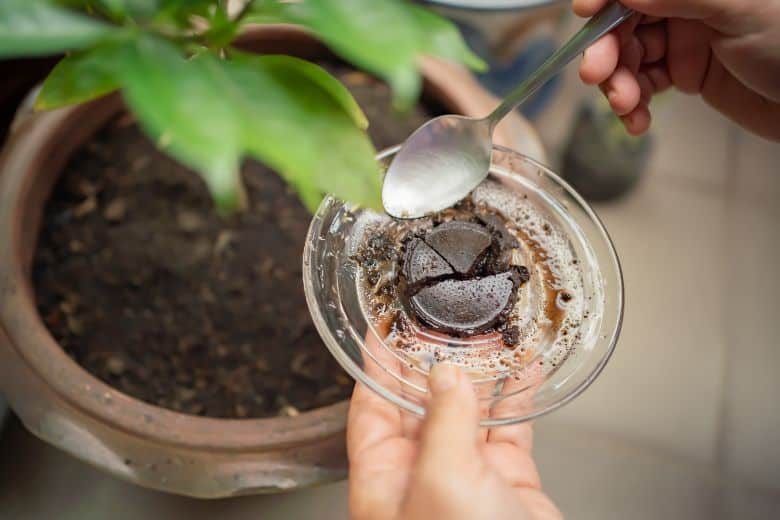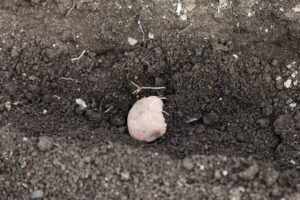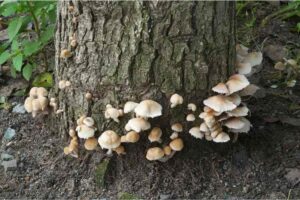
In the fascinating world of indoor gardening, Peace Lilies are one of the most popular choices. So the question begs, ‘Does Peace Lily like coffee grounds?’
The short answer to that is, yes, Peace Lilies do benefit from coffee grounds. The slightly acidic pH of coffee grounds is favorable to Peace Lilies, enhancing their growth and bloom. Coffee grounds also add valuable organic material to the soil, improving its structure and fertility. So, if you’re a coffee lover with a green thumb, your Peace Lily might just be the lucky recipient of your morning coffee remnants.
But don’t just take our word for it, renowned horticulturalist, Dr. Linda Chalker-Scott, confirms the benefit of coffee grounds to Peace Lilies. There’s more to learn about this relationship – from the best methods of application, potential risks, to other household items beneficial for your Peace Lily.
Let’s plunge deeper into the world of Peace Lilies and coffee grounds, and unveil the optimal ways to use your spent coffee to benefit these beautiful plants.
Understanding the Peace Lily Plant
The Peace Lily is a unique and beautiful plant with a long history of being a symbol of peace and tranquility.
Not only is it aesthetically pleasing with its lush, green leaves and white flowers, but it is also a low-maintenance indoor plant that can help to purify the air in your home or office.
With proper care, the leaves of the Peace Lily can stay vibrant and its flowers can bloom for months at a time.
Understanding the care requirements of the Peace Lily is key to ensuring it thrives in your space. From proper watering, light, and soil needs to understanding how to identify and prevent pests, our blog provides a comprehensive guide for caring for this stunning plant.
Benefits of Coffee Grounds for the Peace Lily
Coffee grounds are not just a morning pick-me-up for us humans; they can also benefit our beloved Peace Lily plants.
- Soil Amendment: Coffee grounds are rich in nitrogen, which is an essential nutrient for plants. Mixed into the soil, they can serve as a mild, slow-release fertilizer, offering a consistent source of nitrogen.
- pH Balance: Peace Lilies prefer slightly acidic soil, and used coffee grounds can help to lower the soil pH. This makes them an affordable, organic solution to adjust your soil’s acidity levels.
- Improved Soil Structure: Adding coffee grounds can help improve the structure of the soil, making it more friable (crumbly), which enhances the root development and overall growth of the plant. It also improves the soil’s capacity to retain water and nutrients.
- Pest Control: Some pests, such as certain types of snails and slugs, are deterred by coffee grounds. So, spreading them around your plants can help keep these pests at bay.
- Composting: Used coffee grounds are ‘green’ compost material, rich in nitrogen. They can be added to compost piles to help create rich, beneficial compost to use on your Peace Lily.
However, despite these benefits, coffee grounds should be used sparingly and with caution. Too much can make the soil too acidic, which can harm your Peace Lily. They should also be composted or at least rinsed before use to remove residual caffeine, which can be harmful to plants.
Before adding coffee grounds or any other type of amendment, it’s always a good idea to test your soil to understand its current condition and what it may need. Also, remember that coffee grounds alone won’t provide all the necessary nutrients for optimal plant growth, so it’s important to also use a balanced fertilizer.
Potential Risks of Adding Coffee Grounds to the Peace Lily
Yes, while coffee grounds can offer benefits to Peace Lilies and other plants, it’s also important to be aware of the potential risks:
- Soil Acidity: Peace Lilies prefer slightly acidic soil, but adding too many coffee grounds can make the soil excessively acidic, which can harm the plant. This is especially a risk if your soil is already naturally acidic.
- Over-fertilization: Coffee grounds do contain nitrogen, an essential nutrient for plant growth. However, using too much can lead to an excess of nitrogen, which can actually damage the plant, leading to yellow leaves, stunted growth, or even death.
- Pests and Fungal Diseases: While some pests are repelled by coffee grounds, others might be attracted to them. Also, wet coffee grounds can create an ideal environment for fungal pathogens to thrive, which could potentially lead to diseases.
- Impaired Water Drainage: If used excessively, coffee grounds can compact in the soil, potentially affecting its drainage. Poor drainage can lead to root rot and other water-related problems for the Peace Lily.
- Caffeine Toxicity: Used coffee grounds still contain residual caffeine. While small amounts might not be harmful, larger concentrations can be toxic to plants.
To mitigate these risks, it’s generally best to use coffee grounds sparingly, and to mix them thoroughly with other materials, such as compost or regular garden soil. Also, remember to observe your Peace Lily carefully for any signs of distress after applying coffee grounds or any other type of amendment. In case of any doubt, it’s always a good idea to consult with a local nursery or extension service.
Tips for Adding Coffee Grounds to the Peace Lily
Adding coffee grounds to the soil of the Peace Lily can be a great way to give it an extra boost of nutrients and help it grow to its fullest potential. Here are a few tips for adding coffee grounds to the Peace Lily:
- Always rinse the coffee grounds. This not only reduces acidity but also washes away the remaining caffeine, which can be harmful to the plant.
- Monitor your plant closely after applying coffee grounds. Look for signs of stress, such as yellowing or wilting leaves, which might indicate that the soil has become overly acidic.
- Don’t rely solely on coffee grounds for fertilization. While they can provide some nutrients, your Peace Lily will also need a balanced fertilizer to get all the nutrients it requires.
- Apply coffee grounds as a top dressing to the soil, and not directly against the plant’s stem, to avoid the risk of rot or fungal diseases.
- Water your Peace Lily adequately after adding coffee grounds. It aids in distributing the nutrients and keeps your plant hydrated.
With these tips, you’ll be able to use coffee grounds effectively while minimizing any potential risks, thus giving your Peace Lily a great chance to grow and flourish.
Alternatives to Coffee Grounds for Fertilizing the Peace Lily
While coffee grounds can serve as a useful fertilizer for peace lilies, providing them with essential nitrogen, there are many other alternatives available. Here are some alternatives you might consider:
- Compost: Rich, organic compost is an excellent alternative to coffee grounds. It’s packed with nutrients and beneficial organisms that can help improve the health of your peace lily.
- Worm Castings: Also known as worm manure, worm castings are a rich source of nutrients. They can be mixed with the potting soil or used as a top dressing.
- Liquid Houseplant Fertilizer: A balanced liquid fertilizer (e.g., 20-20-20) can provide peace lilies with the essential nutrients they need. Dilute it according to the manufacturer’s instructions and apply during the growing season.
- Fish Emulsion: This is a great organic alternative, especially if you’re looking for a fertilizer with a high nitrogen content.
- Eggshells: Rinse, dry, and crush eggshells to a fine powder and mix it into the soil. The calcium in eggshells is beneficial for peace lilies.
- Banana Peels: Banana peels are rich in potassium and can be dried and ground into a fertilizer.
- Epsom Salts: Dissolved in water, Epsom salts can provide magnesium and sulfur, which are beneficial for peace lilies.
- Bone Meal: This organic fertilizer is rich in phosphorus and calcium, promoting healthy growth and blooms.
Well, peace lilies are relatively low-maintenance plants and don’t require heavy fertilization. Too much fertilizer can lead to problems like fertilizer burn or excess salt buildup. It’s best to feed your peace lily lightly and regularly during the growing season, and then cut back during the dormant period. Always remember to follow the specific instructions provided by the manufacturer or resource when using any type of fertilizer.
FAQs About the Does Peace Lily Like Coffee Grounds
Does a Peace Lily need coffee grounds to survive?
Answer: No, Peace Lily plants do not require coffee grounds to survive. However, adding coffee grounds to the soil can be beneficial to the plant’s growth.
How often should I add coffee grounds to the soil of my Peace Lily?
Answer: Adding coffee grounds to the soil of your Peace Lily should be done sparingly. A teaspoon of grounds should be enough for every 2-3 months.
What are the benefits of adding coffee grounds to the soil of a Peace Lily?
Answer: Coffee grounds provide organic matter to enrich the soil and make it more fertile. Adding coffee grounds also helps to counteract alkaline soil and makes it more acidic, which is beneficial for many plants, including the Peace Lily.
Conclusion
Although coffee grounds can be a beneficial addition to your Peace Lily care routine. They provide a source of nitrogen and help create slightly acidic conditions that Peace Lilies prefer. However, it’s crucial to use them judiciously, understanding that they are only part of a larger care plan for your plant. Overuse can lead to excessively acidic soil, over-fertilization, or water drainage issues.
By following the tips mentioned above, incorporating coffee grounds into your gardening practice can be done safely and effectively, helping your Peace Lily thrive to its fullest potential. Remember, optimal plant care is about balance and observation, and with a bit of diligence, you’ll be able to create a thriving environment for your Peace Lily.







